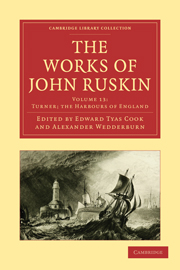Book contents
- Frontmatter
- Contents
- LIST OF ILLUSTRATIONS
- INTRODUCTION TO THIS VOLUME
- PART I
- PART II TURNER'S WORKS AT THE NATIONAL GALLERY
- PART III
- APPENDIX
- I PICTURE GALLERIES; THEIR FUNCTIONS AND FORMATION—EVIDENCE GIVEN BY RUSKIN TO THE NATIONAL GALLERY SITE COMMISSION, APRIL 6, 1857
- II THE CHARACTER OF TURNER
- III MINOR CATALOGUES OF TURNER DRAWINGS
- IV LETTERS ON COPIES OF DRAWINGS BY TURNER
- V TURNERS, FALSE AND TRUE (1871, 1884)
- VI “NOTES ON DRAWINGS BY MR. RUSKIN PLACED ON EXHIBITION BY PROFESSOR NORTON,” AT BOSTON AND NEW YORK, 1879
- VII LIGHT AND WATER-COLOURS
- INDEX
VII - LIGHT AND WATER-COLOURS
Published online by Cambridge University Press: 05 April 2012
- Frontmatter
- Contents
- LIST OF ILLUSTRATIONS
- INTRODUCTION TO THIS VOLUME
- PART I
- PART II TURNER'S WORKS AT THE NATIONAL GALLERY
- PART III
- APPENDIX
- I PICTURE GALLERIES; THEIR FUNCTIONS AND FORMATION—EVIDENCE GIVEN BY RUSKIN TO THE NATIONAL GALLERY SITE COMMISSION, APRIL 6, 1857
- II THE CHARACTER OF TURNER
- III MINOR CATALOGUES OF TURNER DRAWINGS
- IV LETTERS ON COPIES OF DRAWINGS BY TURNER
- V TURNERS, FALSE AND TRUE (1871, 1884)
- VI “NOTES ON DRAWINGS BY MR. RUSKIN PLACED ON EXHIBITION BY PROFESSOR NORTON,” AT BOSTON AND NEW YORK, 1879
- VII LIGHT AND WATER-COLOURS
- INDEX
Summary
[In the spring of 1886, Mr. (now Sir) J. C. Robinson wrote to the Times protesting against the exposure to “the strong light of day” of any modern water-colour drawings in public collections. “If,” he wrote, “the specimens are openly and continuously exhibited to the public in the day-time, in a very few years, by the very fact of such exposure alone, they will be practically ruined and worn out. The strong light of day, indeed, causes such works to fade and wane away daily and hourly even.” He proposed, therefore, that “all national collections of drawings be exhibited to the public in the evenings [by artificial light] and at no other time” (Times, March 11). This letter excited lively controversy, in which Ruskin joined with some acrimony. He was, as we have seen (pp. 83 seq.), in favour of what may be called a system of modified exhibition. He contributed a letter to the Times on the subject, on April 14. This letter is printed below. Among those who took a prominent part in the controversy against Sir J. C. Robinson was Sir J. D. Linton, then P.R.I. With the idea of refuting Sir J. C. Robinson's statement by means of ocular demonstration, an Exhibition of Water-Colour Drawings by Deceased Masters of the British School was held at the Royal Institute in July 1886.
- Type
- Chapter
- Information
- The Works of John Ruskin , pp. 589 - 594Publisher: Cambridge University PressPrint publication year: 2010First published in: 1904

